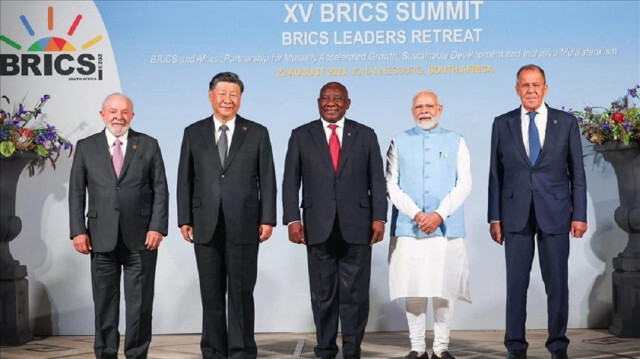
BRICS summit in South Africa ‘not an exercise of asking countries to take sides,’ says Chinese president
Seeking to assure BRICS allies that Beijing was “not hegemonic,” President Xi Jinping has said China “does not have motivation” to engage in "major-power competition" while he has touted the grouping of five nations as “a positive and stable force for good” which “will continue to grow.”
“China stays committed to an independent foreign policy of peace and the building of a community with a shared future for mankind,” Xi told BRICS Business Forum in South Africa’s capital Johannesburg late Tuesday.
BRICS is a bloc of emerging economies that includes Brazil, Russia, India, China, and South Africa. It currently makes up a quarter of the global economy, accounting for a fifth of global trade, and is home to more than 40% of the world’s population.
South Africa is hosting BRICS’ first in-person gathering in four years after the COVID-19 pandemic.
In a written address to the forum, Xi said China has “resolutely upheld the common interests of developing countries and worked to increase the representation and voice of emerging markets and developing countries (EMDCs) in global affairs.”
However, without naming anyone, Xi charged “some country” which is “obsessed with maintaining its hegemony” and “has gone out of its way to cripple the EMDCs.”
He added: “Hegemonism is not in China’s DNA; nor does China have any motivation to engage in major-power competition. China stands firmly on the right side of history, and believes that a just cause should be pursued for the common good.”
- ‘Deliberate clash of civilizations’
Pointing out that the world was undergoing changes “like never before, bringing human society to a critical juncture,” Xi said it was a choice for BRICS whether to “pursue cooperation and integration, or just succumb to division and confrontation?”
“Should we work together to maintain peace and stability, or just sleepwalk into the abyss of a new Cold War? Should we embrace prosperity, openness and inclusiveness, or allow hegemonic and bullying acts to throw us into depression?” he asked.
Xi said the course of history “will be shaped by the choices we make.”
He emphasized that BRICS needs to “promote development and prosperity for all,” adding that many EMDCs “have come to what they are today after shaking off the yoke of colonialism.”
“With perseverance, hard work and huge sacrifices, we succeeded in gaining independence and have been exploring development paths suited to our national conditions,” he added.
Warning against a clash of civilizations by “deliberately creating division with the assertion of ‘democracy versus authoritarianism’ and ‘liberalism versus autocracy,’” Xi said: “Human civilization is colorful by nature. It is precisely because of their differences in history, culture and system that all countries need to interact with one another, learn from each other, and advance together.”
- ‘BRICS fundamentally changing global landscape’
Xi said BRICS is a result of the “collective rise of EMDCs” which is “fundamentally changing the global landscape.”
He said the EMDCs contributed at least 80% of global growth in the past 20 years, and their share in the global GDP has increased from 24% 40 years ago to more than 40% today.
“Whatever resistance there may be, BRICS, a positive and stable force for good, will continue to grow,” he stressed.
“We will forge stronger BRICS strategic partnership, expand the “BRICS Plus” model, actively advance membership expansion, deepen solidarity and cooperation with other EMDCs, promote global multipolarity and greater democracy in international relations, and help make the international order more just and equitable,” said the Chinese president.
He also said that the BRICS countries joined by more than 50 other countries in South Africa was “not an exercise of asking countries to take sides, nor an exercise of creating bloc confrontation.”
“It is an endeavor to expand the architecture of peace and development,” he said.
“China hopes to see more joining the BRICS cooperation mechanism.”

